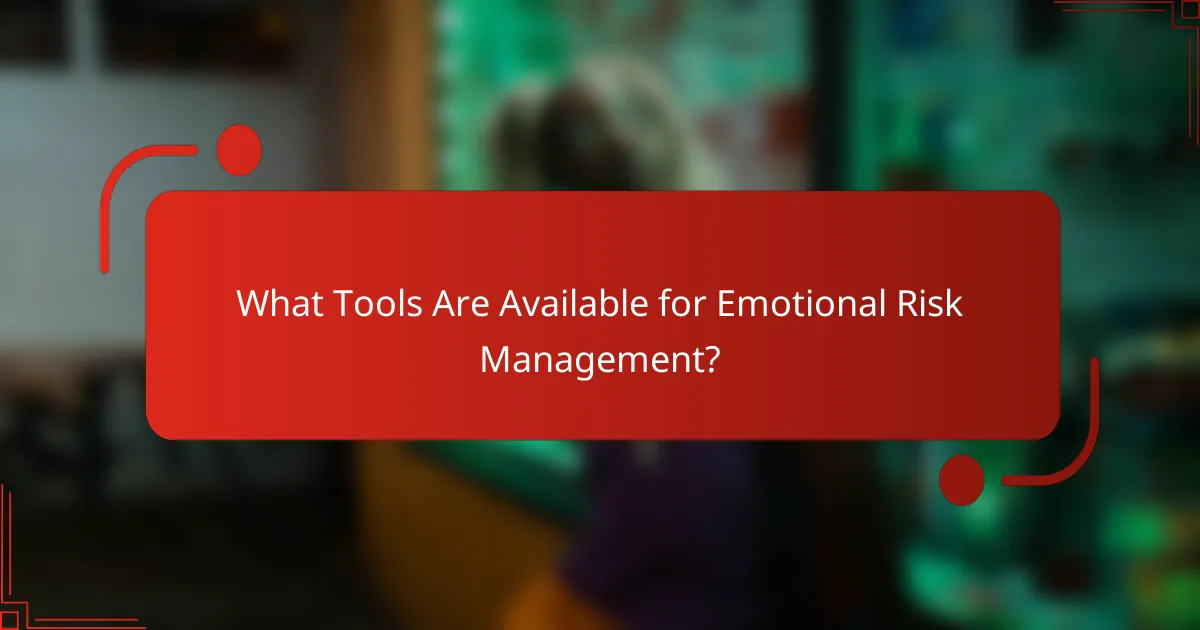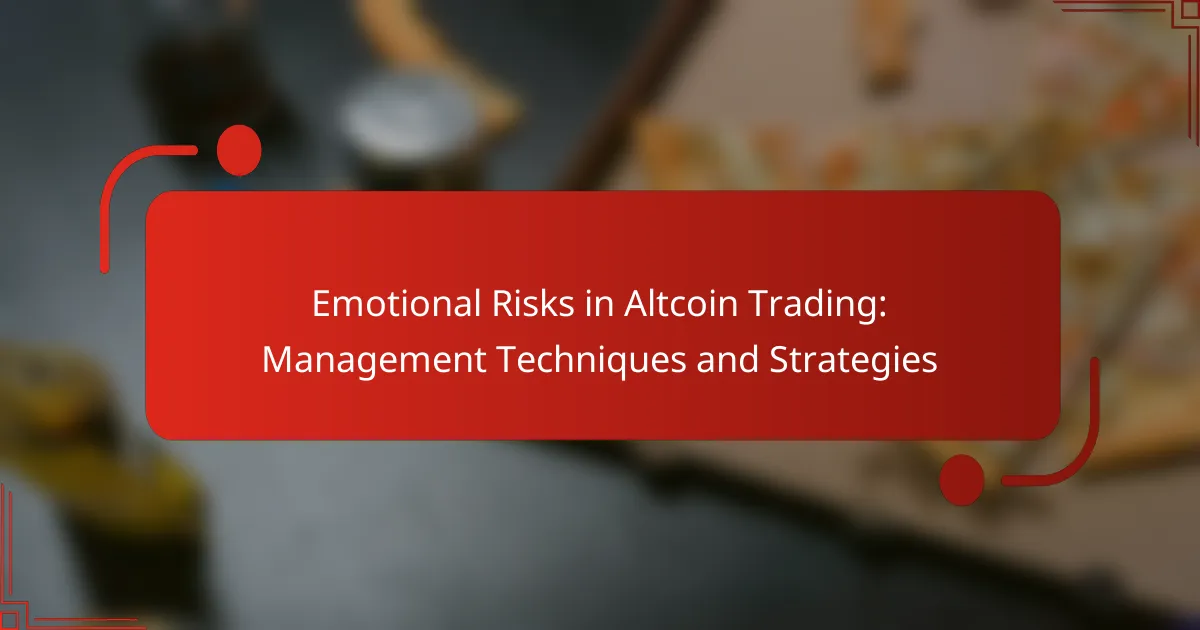Emotional risks in altcoin trading can significantly impact decision-making and overall trading success. By implementing structured strategies such as creating a trading plan, utilizing risk management tools, and practicing mindfulness, traders can maintain discipline and make informed choices. Recognizing emotional triggers and enhancing education on market dynamics further empower traders to navigate the volatile landscape of altcoins effectively.

What Are the Main Solutions for Managing Emotional Risks in Altcoin Trading?
Managing emotional risks in altcoin trading involves implementing structured strategies that help traders maintain discipline and make informed decisions. Key solutions include creating a trading plan, utilizing risk management tools, practicing mindfulness, setting realistic goals, and engaging with community support.
Implementing a Trading Plan
A well-defined trading plan is essential for managing emotional risks in altcoin trading. It should outline your trading strategy, entry and exit points, and risk tolerance. By adhering to this plan, you can avoid impulsive decisions driven by market emotions.
Regularly review and adjust your trading plan based on market conditions and personal experiences. This adaptability helps you stay grounded and focused on your long-term objectives rather than short-term market fluctuations.
Utilizing Risk Management Tools
Risk management tools are vital for protecting your capital and minimizing emotional stress. Use stop-loss orders to automatically sell an asset when it reaches a certain price, preventing significant losses. Position sizing is another technique that helps limit exposure to any single trade.
Consider diversifying your portfolio across various altcoins to spread risk. This approach can help mitigate the emotional impact of a poor-performing asset, as gains in other investments can offset losses.
Practicing Mindfulness Techniques
Mindfulness techniques can significantly reduce emotional risks in trading. Practices such as meditation, deep breathing, or even short breaks during trading sessions can help you maintain focus and clarity. These techniques allow you to step back from emotional reactions and make more rational decisions.
Incorporating mindfulness into your routine can improve your overall trading performance. Regularly practicing these techniques can help you develop a more balanced perspective on market movements and your trading outcomes.
Setting Realistic Goals
Setting realistic goals is crucial for managing emotional risks in altcoin trading. Establish clear, achievable objectives based on your trading experience and market conditions. Avoid setting overly ambitious targets that can lead to frustration and emotional distress.
Break down your goals into smaller milestones, such as achieving a certain percentage return over a specific period. This approach allows for a sense of accomplishment and helps maintain motivation without overwhelming pressure.
Engaging in Community Support
Engaging with a trading community can provide valuable emotional support and insights. Connecting with other traders allows you to share experiences, strategies, and challenges, which can help alleviate feelings of isolation and anxiety.
Participate in forums, social media groups, or local meetups focused on altcoin trading. These interactions can foster a sense of belonging and provide encouragement, making it easier to navigate the emotional ups and downs of trading.

How Can Traders Identify Emotional Triggers?
Traders can identify emotional triggers by observing their reactions to market changes and personal trading experiences. Recognizing these triggers helps in managing emotional responses that can lead to poor trading decisions.
Recognizing Market Volatility
Market volatility often acts as a significant emotional trigger for traders. Sudden price swings can induce fear or excitement, leading to impulsive decisions. It’s essential to monitor market trends and set clear thresholds for acceptable volatility levels.
For instance, if a trader notices that a particular altcoin frequently fluctuates by 10% or more in a day, they should prepare for the emotional impact of such volatility. Establishing a plan for these scenarios can help mitigate emotional reactions.
Tracking Personal Trading Patterns
Analyzing personal trading patterns is vital for identifying emotional triggers. Traders should keep a trading journal to record their decisions, emotions, and outcomes. This practice can reveal patterns that indicate when emotions influence trading choices.
For example, if a trader consistently makes rash decisions after consecutive losses, they can recognize this pattern and implement strategies to avoid emotional trading during such times.
Monitoring Emotional Responses
Monitoring emotional responses during trading sessions can help traders understand their psychological state. Techniques such as mindfulness or self-reflection can assist in recognizing feelings of anxiety, greed, or frustration as they arise.
Traders can use tools like mood tracking apps or simple checklists to assess their emotional state before making trades. By acknowledging these feelings, traders can take a step back and avoid making decisions driven by emotion rather than strategy.

What Role Does Education Play in Emotional Risk Management?
Education is crucial in managing emotional risks in altcoin trading as it equips traders with the knowledge to make informed decisions. By understanding market dynamics, technical analysis, and behavioral finance, traders can mitigate emotional reactions that lead to poor trading choices.
Understanding Market Fundamentals
Grasping market fundamentals is essential for any trader. This includes knowledge of how altcoins operate, the factors influencing their prices, and the overall market environment. For instance, understanding supply and demand dynamics can help traders anticipate price movements and avoid panic selling.
Traders should familiarize themselves with key concepts such as market capitalization, liquidity, and trading volume. These metrics can provide insights into market health and potential volatility, allowing traders to better manage their emotional responses during market fluctuations.
Learning Technical Analysis
Technical analysis involves studying price charts and historical data to predict future price movements. By mastering this skill, traders can identify trends and patterns that inform their trading strategies, reducing the likelihood of emotional decision-making. For example, recognizing support and resistance levels can help traders set realistic entry and exit points.
Utilizing tools like moving averages and relative strength index (RSI) can further enhance a trader’s ability to make data-driven decisions. This analytical approach can help traders remain calm during market swings, as they rely on objective data rather than emotions.
Studying Behavioral Finance
Behavioral finance examines the psychological factors that influence trading behavior. Understanding common biases, such as overconfidence or loss aversion, can help traders recognize when their emotions may lead to irrational decisions. For example, a trader may hold onto a losing altcoin due to fear of loss, rather than evaluating its market potential objectively.
By studying behavioral finance, traders can develop strategies to counteract these biases. Techniques such as journaling trades and reflecting on emotional responses can foster greater self-awareness and discipline, ultimately leading to more rational trading practices.

How Can Traders Develop a Resilient Mindset?
Traders can develop a resilient mindset by cultivating emotional awareness, practicing stress-reduction techniques, and emphasizing a long-term perspective. These strategies help manage the emotional risks associated with altcoin trading, enabling better decision-making and improved performance.
Building Emotional Awareness
Emotional awareness involves recognizing and understanding your feelings during trading activities. By identifying emotions such as fear or greed, traders can make more rational decisions rather than impulsive ones driven by these feelings.
Keeping a trading journal can enhance emotional awareness. Documenting your thoughts and feelings during trades allows you to spot patterns in your emotional responses and adjust your strategies accordingly.
Practicing Stress-Reduction Techniques
Incorporating stress-reduction techniques into your routine can significantly improve your trading mindset. Techniques such as deep breathing, meditation, or regular physical exercise help lower stress levels and enhance focus.
Setting aside time for relaxation and mindfulness can prevent burnout. Aim for at least a few minutes daily to engage in activities that calm your mind, which can lead to clearer thinking during trading sessions.
Emphasizing Long-Term Perspective
Maintaining a long-term perspective helps traders avoid the pitfalls of short-term volatility in altcoin markets. By focusing on overall trends rather than daily fluctuations, traders can make more informed decisions that align with their financial goals.
Consider setting specific long-term objectives, such as a target return over several months or years. This approach can help mitigate emotional reactions to temporary market downturns and encourage patience and discipline in trading strategies.

What Tools Are Available for Emotional Risk Management?
Emotional risk management in altcoin trading involves using various tools to help traders maintain discipline and make rational decisions. These tools can assist in tracking emotions, automating trades, and analyzing market sentiment.
Trading Journals
Trading journals are essential for documenting trades, strategies, and emotional responses. By keeping a detailed log, traders can identify patterns in their behavior and decision-making processes, which can help in recognizing emotional triggers.
To effectively use a trading journal, record the date, asset, entry and exit points, and your emotional state during the trade. Review your journal regularly to spot trends and adjust your strategies accordingly.
Automated Trading Bots
Automated trading bots execute trades based on pre-defined criteria, reducing the influence of emotions on trading decisions. These bots can operate 24/7, allowing traders to take advantage of market movements without being present.
When selecting a trading bot, consider factors such as ease of use, customization options, and the bot’s performance history. Ensure you understand the bot’s algorithms and set realistic profit targets to avoid over-reliance on automation.
Market Sentiment Analysis Tools
Market sentiment analysis tools gauge the overall mood of the market, helping traders make informed decisions. These tools analyze social media, news articles, and trading volumes to provide insights into market trends.
Using sentiment analysis can help you identify potential market reversals or bullish trends. Combine sentiment data with technical analysis to create a more comprehensive trading strategy, but be cautious of overreacting to short-term sentiment shifts.

What Are the Common Emotional Pitfalls in Altcoin Trading?
Common emotional pitfalls in altcoin trading include fear of missing out (FOMO), overconfidence, and panic selling. These emotions can lead to impulsive decisions, resulting in significant financial losses and increased stress.
Fear of Missing Out (FOMO)
FOMO in altcoin trading occurs when investors feel pressured to buy a cryptocurrency because they believe it will rise in value quickly. This emotional response often leads to hasty purchases without proper analysis, increasing the risk of losses.
To manage FOMO, traders should establish clear investment criteria and stick to their strategies. Setting predefined entry and exit points can help mitigate impulsive decisions driven by market hype.
Consider using a checklist before making a trade, including factors like market trends, project fundamentals, and your risk tolerance. This approach can help you remain disciplined and avoid falling into the FOMO trap.
